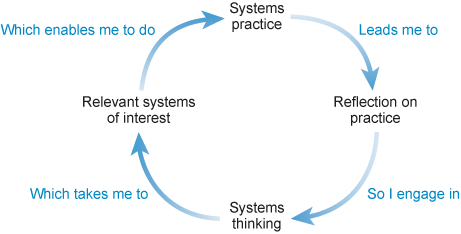TB871: Systems practice competencies
Note: this is a post reflecting on one of the modules of my MSc in Systems Thinking in Practice. You can see all of the related posts in this category.

A strategic thinker has a mental model of the complete end-to-end system of value creation, his or her own role in it, and an understanding of the competencies it contains.
(Liedtka, 1998, quoted in Open University, 2020)
Activity 1.10 focuses on our relative strengths and weaknesses when it comes to systems practice (competencies) relevant to making strategy. We’re asked to reflect on the following list:
(Adapted and further developed from a discussion paper (Open Systems Group, 2004) among members of the Open University Applied Systems Thinking in Practice group, cited in Open University, 2020)
- Systems practice is reflective practice.
- An aware systems thinking practitioner has the ability to use systems thinking as part of a process of learning (by them or with others), in which the outcome is the improvement of a situation of concern.
- The particular form of learning at the core of systems practice is concerned with enabling effective action among stakeholders in complex situations. This involves collaborative action or social learning.
- Systems practice recognises the significance of making boundary judgements and continually exploring purpose.
- In addition to problem solving, systems practice can help identify what other problems might be relevant to a situation.
- Systems practice is a transdisciplinary skill used to complement and support an existing skill set from a single discipline.
- Part of the transdisciplinary skill is in using a systems literacy that helps facilitate interdisciplinarity.
- Systems practice draws on but is different from systems science or complexity science in that it attends to judgements on boundaries and values as much as judgements on facts.
I’ve identified what I consider to be my existing main strength in bold above, namely: Systems practice is reflective practice. This is because I was drawn towards systems thinking because of the way that I reflect upon my life and work.
In terms of my greatest weakness, or area for development, which I’ve highlighted in italics above, I’d say it is: In addition to problem solving, systems practice can help identify what other problems might be relevant to a situation. That is to say, I very much see life in general as a problem to solve and so am likely to become somewhat fixated on the initial problem, rather than investigating others.
References
- The Open University (2020) ‘1.3.1 Why strategy needs systems practice’, TB872 Block 1 Systems and Strategy [Online]. Available at https://learn2.open.ac.uk/mod/oucontent/view.php?id=2261477§ion=3.4 (Accessed 11 May 2024).


You might want to take a look a garth morgans competences for 21st c organisations. In many respects these are the required ST competences. Noting these ” ST competences” also require ST knowhows, eg knowhow to draw a causal/cognitive (SODA)
Noting also ST requires a high degree of conceptual and critical thinking